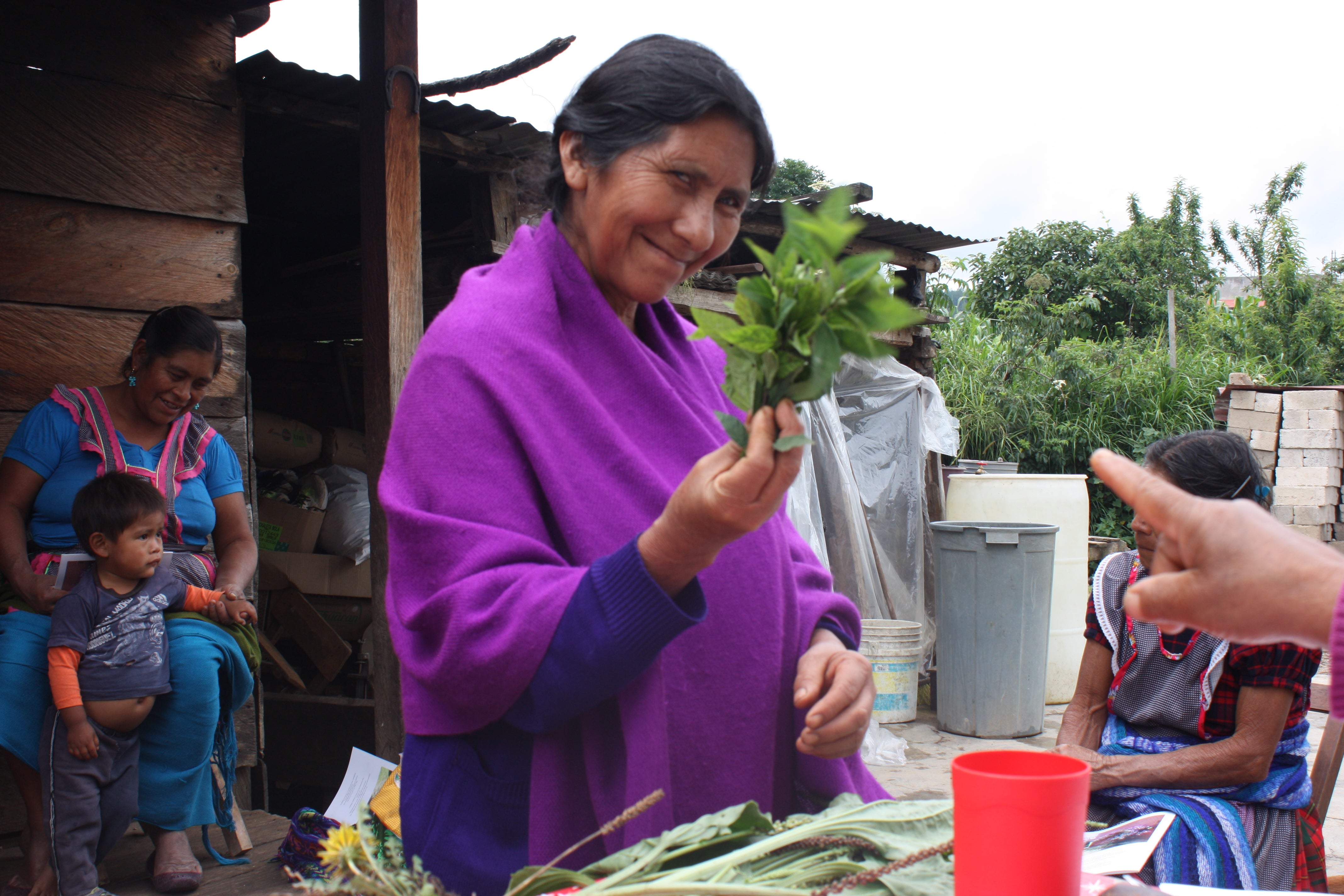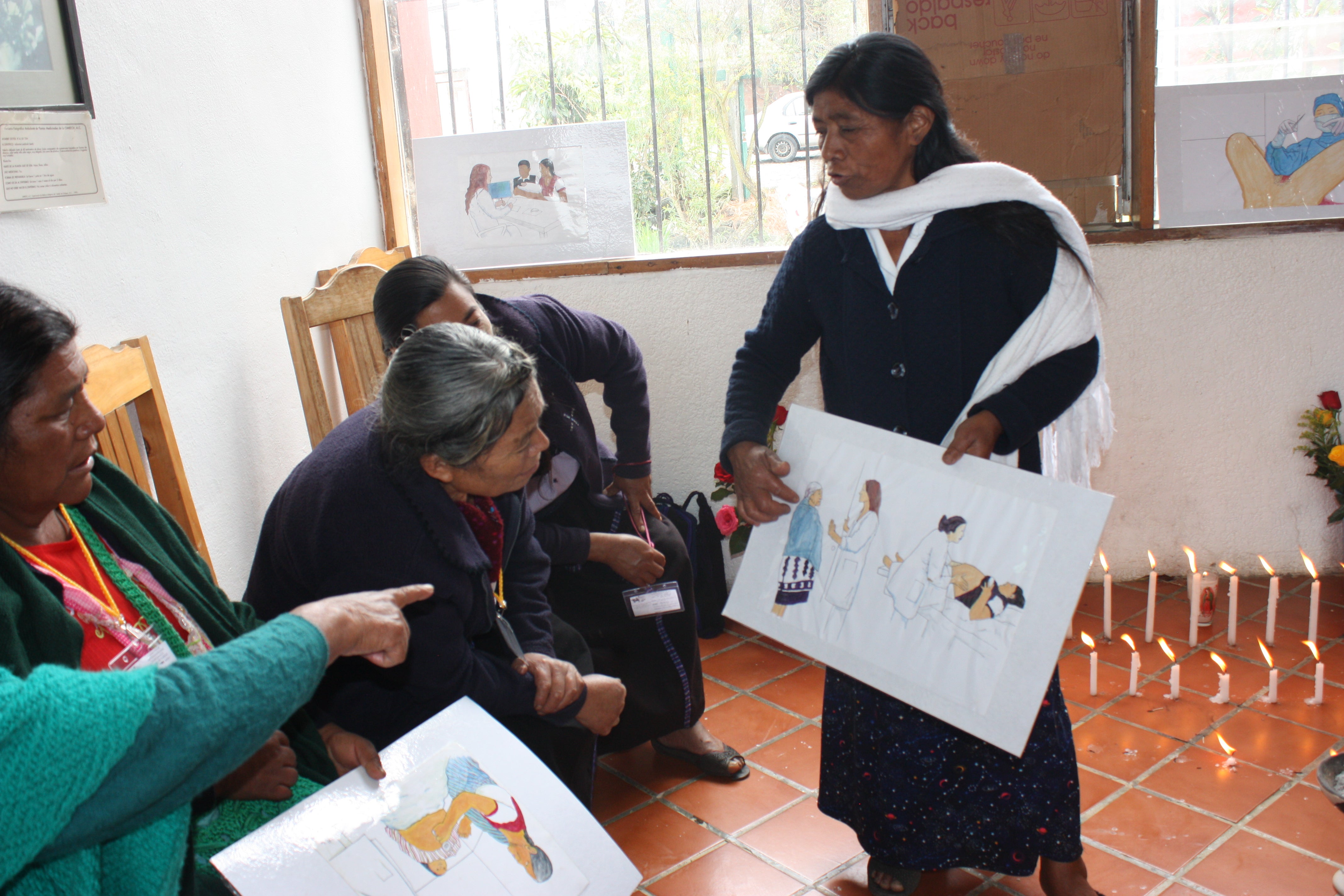The Organization of Indigenous Doctors of Chiapas (OMIECH) was formed in 1985 by Tzotzil, Tzeltal, and Ch’ol Maya health promoters and traditional doctors. Our objective is to revive, develop, systematize, and defend traditional Maya medicine. The Women and Midwives Section of OMIECH is made up of 51 traditional midwives from 4 municipalities and 8 communities of the Highlands and Northern regions of Chiapas, Mexico. We implement workshops that reinforce the intergenerational transmission of our traditional midwifery within each family and community. In these workshops and the Women and Midwives Section regional meetings, we discuss topics including maternal mortality; care during pregnancy, birth, and postpartum; and the conservation and defense of medicinal plants and animals. In recent years, our work has focused on developing strategies to stop the public policies that threaten the survival of traditional Indigenous midwifery in Mexico. The following is a portrait of a Tzotzil midwife narrated by the Women and Midwives Section’s coordinator, Micaela Icó Bautista.
As young girls, jtamoletik (traditional midwives) dream that they will be midwives. God (in Tzotzil, Kajvaltik, Jtotik, Ch’ul totik ta Vinajel, Ch’ulme’tik ta Ch’ul Balumil) gives us a sign through our dreams. He/She gives us the materials we will use. We learn from our dreams and by attending the births of our own children. We also learn from more experienced midwives, our grandmothers, mothers, and others. When a woman seeks us out, it is our duty to give her and her husband advice. Depending on the patient, whether she is ill, tired, or malnourished, we will see what she needs. We tell the husband how he can help his wife.
Some midwives are also j’iloletik (healers, “she/he who sees beyond”). Healers are able to communicate directly with their patient’s spirit. They diagnose their patients by feeling their pulse. This diagnosis is important, because some women do not want to tell us when they have problems.

Consuelo López Díaz (Tzeltal), traditional midwife. Photo by Filiberto Sebastián Luna Icó.
During a pregnancy, we have to ask for the protection of our patient three times. The healer knows how to prevent and treat illness that is the result of envy or an encounter with an evil spirit. In her prayer, the healer speaks to both the woman and the baby, and she speaks to God. Midwives who are not healers also know how to pray and ask for protection for their patient. The woman also has to speak with God so that all may go well in her pregnancy. She has to speak to Him/Her, deliver herself to Him/Her, every day. One cannot forget to do this.
By the fourth month of pregnancy we can tell whether the baby is well positioned. We give the mother an abdominal massage whenever she needs it. In this way we monitor her until her pregnancy is full term. Sometimes the mother or the baby is rebellious. We correct the baby’s position and within no time it has moved again. This has meaning for us campesina women. When a baby is malpositioned it is because we set down our firewood without untying the tumpline, or because we left the batten in a crooked position on our loom. The baby copies what we do in our day to day tasks. This is why midwife-healers perform both “the secret” and prayer. They have different ways of performing the secret so that the baby will remain in the right position.
What we want is for women to come see us at the beginning of their pregnancy. This is for the benefit of both them and their family. Some midwives go from village to village to see the mothers who are going to give birth. This is why our work is important for women, our communities, and ourselves: we prevent maternal deaths. There are medicinal plants not only for treating and managing complications, but also for preventing them.

OMIECH midwives critique the discriminatory practices of government health personnel. Photo by Agripino Icó Bautista.
When some women go into labor, they suffer a lot of pain because coldness has entered their body. We lay them down on a petate (straw mat), check their abdomen, warm it and massage it, and the pain goes away. When the baby is almost crowning, the mother squats down and we put a faja (wide woven belt) around her waist. If the baby is a little malpositioned, you have to get a firm hold on his shoulder and hand, and then from the outside, turn his body in a circular motion and get him into a good position. In some cases we put vegetable oil on the birth canal so that the baby will slide out more easily. When the child is born we sit with it next to the fire and bathe it in lukewarm water. We lay the umbilical cord on a corn cob and cut it with a small piece of reed. If the placenta does not come out, the mother should be given a tea made from the tail of a tlacuache.
After the birth, we boil a tea of pepper, cloves, and ginger. This tea is very good for decreasing postpartum bleeding and for cleaning and warming the uterus. If a midwife knows how to use the pus (sweat lodge), this is good for women. It warms their uterus and returns it almost to its original size. The mother should take care of herself for two or three months and she should not drink cold water because the medicine is hot.
We midwives know about plant medicine. The sacred plants are very powerful. They did not grow on their own. Rather, they have a guardian/provider: the sacred earth. They have spirits, just as the healer, ac’vomoletik (herbalist), and the midwife have spirits. When a person does not know the plant, it’s because she has not been introduced to it in her dreams. In dreams, we learn about where it grows and its uses. If you
do not dream about how to talk to the plant, then there is no communication. For this reason, not just anyone can use the plants.
Midwives sow and harvest plants and they store them in their home pharmacies. But they do not harvest them at just anytime. There’s a secret to this. The healers say that if you have faith, you can use plant medicine. But if you deny the plant’s power, if you do not trust in the plant, it will not heal you. Likewise, it is important that a woman trust her midwife so that there are no complications during her pregnancy and birth.
In OMIECH, we exchange knowledge with other midwives. These meetings are very important because we learn about how other midwives care for their patients and what plants they use. We support each other. Despite the Secretary of Health’s attempts to force us to attend training courses in which we are prohibited from using our traditional practices, we continue to attend the majority of births in our communities. When we do not attend these courses our social welfare benefits are withheld and our patients are denied access to birth certificates.
This attempt to suppress the practice of traditional midwives has resulted in high rates of cesarean sections in Mexico. These surgeries only benefit the pharmaceutical companies that supply hospitals with the medicine and equipment used for obstetric care. The more women who seek care in hospitals, the richer these companies become, while our own traditional Indigenous midwifery dies out. And if this happens, who will attend our granddaughters’ pregnancies and births?
In Mexico, there are some groups of traditional midwives who demand government recognition and aid. We do not want the government’s aid or interference. We simply want the attacks on our knowledge and customs to stop, and we will fight tirelessly to ensure that our own form of midwifery continues to be valued and practiced in our communities.
Organization of Indigenous Doctors of Chiapas (OMIECH) is a Cultural Survival Keepers of the Earth Fund (KOEF) grant partner. KOEF is an Indigenous-led fund designed to support Indigenous Peoples’ community development and advocacy projects. Since 2017, through small grants and technical assistance, KOEF has supported 119 projects in 31 countries totaling $488,475.
— Micaela Icó Bautista (Tzotzil) is from San Andrés Puerto Rico, Huixtan, and is co-founder of OMIECH, where she has worked since 1985 as the coordinator of the Women and Midwives’ Section. Susannah Daniels has a PhD in Mesoamerican Studies from the National Autonomous University of Mexico. She has worked with the Women and Midwives’ Section of OMIECH since 2017.
Top photo: OMIECH midwives exchange medicinal plant knowledge. Photo by Filiberto Sebastián Luna Icó.
